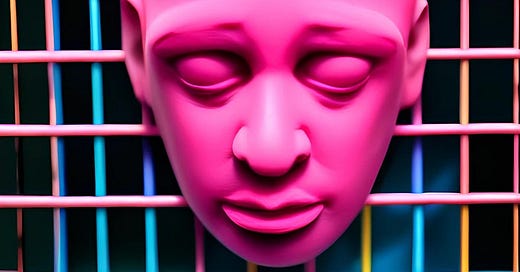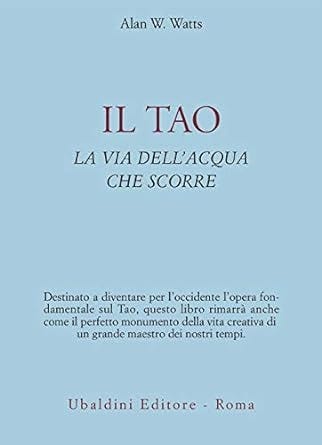Reality Hacked: How Alan Watts' Book on Tao Blew My Mind
Rigid rules and classifications are like opaque cages that confine our thinking
Rigid rules and classifications are like opaque cages that confine our thinking — AI Image by Author (Stable Diffusion)
“The Tao — The Watercourse Way” by Alan Watts, published by Astro-Ubaldini Editore, has been a pure revelation for me. A work that shook the very foundations of how I related to reality, shaped by the rationalist and defining tradition of the West.
I have always been obsessed with the need to fill every space, to grasp and define every fragment of existence. From a young age, I was conditioned to categorize and label everything around me. A flower was reduced to a mere “plant”, a cloud to an insignificant “mass of water droplets”.
Yet, while reading Watts, I realized that in doing so I was betraying the ephemeral and transitory essence of things, their perpetual becoming.
“Aren’t we losing the sense of their impermanent dance?”
one of his reflections shook me deeply.
Void
And the author responded:
“It is not the word, the definition, that fills existence with meaning. The void has already taken care of that.”
The void, the “Wu” of Taoist thought, is not a sterile absence but a cosmic womb pregnant with infinite potentialities.
“It is here that everything is born, changes and transforms, before returning once more to its origin.”
A disruptive concept for me, always striving to grasp being, to fix it in immutable essences.
Cosmic Womb
Watts revealed to me that Wu is
“The space of non-being from which being itself springs forth, the cosmic womb that embraces the perpetual becoming of the universe.”
An embrace, not a defined cage.
In the Chinese tradition, I discovered, there is no interest in
“imprisoning meaning within rigid definitions”,
which end up being limiting prisons. Rather, space is preferred for fluid interpretation and the association of images.
An approach that privileges becoming, non-linear change, rejecting the very absoluteness of the concept of “being” as understood in the West. Reasoning in China indeed proceeds through the use of verbs, rendering the very essence of being a debatable opinion, not a dogma.
Ideograms
The main tool of Chinese thought is ideograms, images associated according to visual similarities, just as with metaphor. There are therefore no truly fixed and defined concepts once and for all, as we are accustomed to. On the contrary, the fusion of meanings is in continuous metamorphosis.
The Tao — The Watercourse Way — Astro-Ubaldini Editore. Western Rationality
“The Chinese word is image before sound,”
Watts clarified to me, as I deciphered the mechanism of the ideogram in which the various signs converge to create a floating meaning, never caged in the translation of a single word.
Yet I, son of Western rationality, dared daily to fill the primordial void with my reassuring definitions, allowing others to trace the narrow confines of my perception.
“Such an approach has no real justification!”
Watts’ voice unmasking my illusory certainties.
It was then that I decided: I had to open myself to the embrace of Wu, that undefined womb that permeates every phenomenal manifestation without claiming to contain it. And so, for the first time, I truly saw a cloud, no longer an arid scientific category, but an entity in perpetual becoming, renewing itself instant by instant in the play of changing forms.
A flower was no longer just a “plant”, but a momentary explosion of colours, fragrances and fluid geometries, ready to dissolve and perpetually reflower before my eyes. I perceived its subtle pattern, beyond the faded conventional definitions.
Knowledge
“Five colors blind the eyes; five tones deafen the ears; five flavors ruin the palate.”
Lao Tzu’s quote reported by Watts echoed within me. Yes, the rules and formal categorizations are nothing but opaque cages to that authentic vision that welcomes the infinite richness of the real.
I remember the early Taoists, who radically questioned common Chinese sense, warning:
“When knowledge and skill arrived, the great deception arrived.”
A deception that I too had undergone, mistaking mental constructs for the living substance of things.
Another striking teaching, this time from Lancelot Whyte:
“Thought arises from defeat when action is no longer satisfactory.”
Vital experience
How many times had my analytical approach drained the direct and vital experience of the present, confining me within the perimeter of concepts?
“When knowledge and skill arrived, the great deception arrived. When family relations were no longer in harmony, then came the idea of good parents and faithful children. When the state fell into disorder and misrule; then came the idea of loyal ministers.”
(Lao Tzu)
“Conscious control of life seems to involve us in an increasingly convulsive tangle of complexity,”
Watts continued in his indictment against the analytical mind. A terrifying and pitiless mirror in which I recognized myself, so often imprisoned by mental labyrinths, deaf and blind to the flow of life.
How did this impact my daily life?
This book was a true initiation for me, an awakening to the simplicity and wonder of living beyond conceptual superstructures. A total and ecstatic immersion in that mystery that the mind can only betray in its frenzied delirium of capture.
Now, as soon as I feel the urge to define or judge what surrounds me, Watts’ voice holds me back:
“Do not betray the ineffable essence of things, do not imprison them within mental categories!”.
And I, finally free, surrender to the naked experience, without the need for answers or reassuring coordinates.
Immersed in the Tao, the Watercourse Way, where everything is born and dissolves in a single breath, before flowing back into the womb of the original Void. Letting Life itself speak, beyond all my attempts to grasp it.
What do you think about my article?
Feel free to leave a comment.
I have woven tales to share, for any who care to read them. My books await you on Google Books. Check also my stories on Medium.com.
I am actively involved in helping to train AI models to become better writers. Therefore, I would be grateful to anyone who is in contact with this industry to recommend me to the right people. Thanks.
I would be honoured if you considered subscribing to the Premium Contents of my Vedanta Substack and leaving feedback, comments, and suggestions both on this page and by writing to me at cosmicdancerpodcast@gmail.com.
Visit my BuyMeACoffee page.
Thanks for reading.





